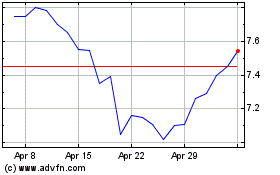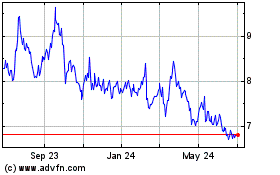Nissan Gets Out of E-Car Batteries -- WSJ
August 09 2017 - 3:02AM
Dow Jones News
The acquirer, GSR Capital of China, could face scrutiny from
U.S. regulatory agency
By Sean McLain
This article is being republished as part of our daily
reproduction of WSJ.com articles that also appeared in the U.S.
print edition of The Wall Street Journal (August 9, 2017).
TOKYO -- Nissan Motor Co. has agreed to sell its battery
business including its U.S. operations to a Chinese investment
firm, setting the stage for a potential ruling by a U.S. regulator
on the transfer of sensitive technologies.
The buyer, GSR Capital, agreed Tuesday to buy the majority of
Nissan's electric car battery operations for an undisclosed sum.
The deal, which the parties said they expected to close by the end
of the year, includes Nissan's battery manufacturing operations in
Smyrna, Tenn.; Sunderland, England, and Japan.
Nissan also agreed to hand over part of its battery research
operations in Japan and battery subsidiary Automotive Energy Supply
Corp., which it has operated as a joint venture with NEC Corp. of
Japan but would be fully owned by GSR Capital under the deal.
Batteries are among the most sought-after areas of technology
because leading car makers have said they plan to boost sharply the
proportion of their sales coming from electric-powered cars. South
Korea and Japan have some of the battery industry's leading
companies, with China in fast pursuit.
GSR Capital chairman Sonny Wu said in a statement that the deal
"represents an important step for us in the new energy vehicle
industry chain."
Nissan has been seeking to get out of the battery manufacturing
business for some time. Chairman Carlos Ghosn has said the joint
venture with NEC was set up a decade ago when Nissan had few
options for getting electric-car batteries except making them
itself. Today, there are a number of suppliers competing on price
and technology, so it makes sense for Nissan to purchase from
outside the company, he has said.
Those options include LG Chem Ltd., which supplies batteries to
Nissan's alliance partner Renault SA. Mr. Ghosn told The Wall
Street Journal in 2015 that he would consider using LG batteries in
future electric vehicles.
In 2015, GSR Capital raised a $5 billion buyout fund. Its
chairman, Mr. Wu, is also the co-founder of venture-capital firm
GSR Ventures, which made its name investing in some of China's most
famous tech startups, including ride-hailing company Didi Chuxing
Technology Co.
One of GSR Venture's deals, for an automotive-lighting unit of
Royal Philips NV, broke down over concerns from the Committee on
Foreign Investment in the U.S., known as CFIUS -- an interagency
group led by the Treasury Department that has the power to review
foreign investments.
The battery deal with GSR Capital could face scrutiny from
CFIUS, since it includes the transfer of a U.S. manufacturing
facility.
In a text message, Mr. Wu said, "We will jointly file for CFIUS
with Nissan." He said GSR Ventures has acquired stakes in two
U.S.-based battery companies in the past.
Mr. Wu and a Nissan spokesman declined to comment on
expectations for the regulatory process.
The deal comes amid U.S. lawmakers' calls for greater scrutiny
of deals involving Chinese investors.
GSR Capital expects close scrutiny of the deal from CFIUS and is
lining up a charm offensive in the U.S. to ensure approval, said a
person with knowledge of the company's thinking.
The deal comes as Nissan prepares to introduce a new version of
its Leaf electric car next month, which it says will have increased
range and the ProPilot autonomous driving suite. Nissan is also
developing a low-cost electric vehicle for China.
GSR Capital said that if the deal goes through, it plans to
construct a battery facility in China.
Write to Sean McLain at sean.mclain@wsj.com
(END) Dow Jones Newswires
August 09, 2017 02:47 ET (06:47 GMT)
Copyright (c) 2017 Dow Jones & Company, Inc.
Nissan Motor (PK) (USOTC:NSANY)
Historical Stock Chart
From Oct 2024 to Nov 2024

Nissan Motor (PK) (USOTC:NSANY)
Historical Stock Chart
From Nov 2023 to Nov 2024
